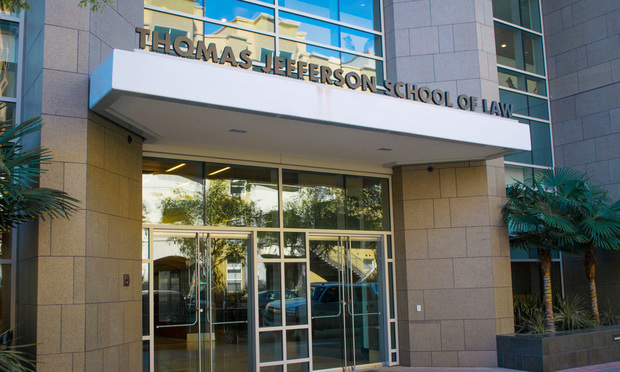On a Roll, ABA Yanks Accreditation From Thomas Jefferson School of Law
Administrators at the law school say they plan to appeal the ABA's revocation of its accreditation, but the stand-alone campus faces numerous hurdles including falling enrollment, poor graduate job outcomes and dismal bar pass rates.
June 11, 2019 at 12:31 PM
6 minute read
 Thomas Jefferson School of Law. March 2013. Photo: Visitor7 via Wikimedia Commons
Thomas Jefferson School of Law. March 2013. Photo: Visitor7 via Wikimedia Commons
The American Bar Association had, until 2018, never withdrawn its seal of approval from a fully accredited law school.
Now it has revoked accreditation from two schools in the span of a year—a reckoning within legal education that would have been unthinkable a decade ago.
The ABA's Council of the Section of Legal Education and Admissions to the Bar on Monday announced that it has withdrawn accreditation from the standalone Thomas Jefferson School of Law in San Diego for failing to comply with its admissions, governance and academic program standards.
That decision, made by the council last month, became public almost exactly one year after the council pulled accreditation from Arizona Summit Law School. That Phoenix school shut down several months later after an unsuccessful bid to appeal the revocation of its accreditation.
It remains to be seen whether Thomas Jefferson will meet the same fate. In a prepared statement released Monday, Interim Dean Linda Keller said the school plans to appeal the decision and will remain accredited during the course of that process, which is expected to extend into the fall. Moreover, Thomas Jefferson has been working since 2016 to secure accreditation from the Western Association of Schools and Colleges, though approval of its application has been stalled despite two separate site visits. The school was previously accredited by WASC until it voluntarily withdrew in 2006.
Thomas Jefferson also has a lifeline that Arizona Summit did not—the school has secured accreditation from the State Bar of California, which allows its graduates to sit for the bar exam within the state, Keller said in an email Tuesday. Still, such a change in status would likely hurt enrollment. Arizona does not have such a program and only allows graduates of ABA-accredited law schools to take its licensing exam.
“The law school is disappointed by this capricious decision and strongly disagrees with the council's findings,” Keller wrote in her prepared statement. “The law school has taken concrete and significant steps in response to the council's concerns, and has fundamentally changed, transforming into a smaller, stronger school.”
Kyle McEntee, executive director of the nonprofit organization Law School Transparency, said the ABA's decision sends a message to other law schools that they cannot plug revenue shortfalls by exploiting students for their tuition dollars.
“Despite routinely being at the bottom of job outcomes, [Thomas Jefferson] also ranks at or near the top in terms of student debt,” McEntee said. “The school just couldn't figure out how to do right by their students.”
The ABA has directed the school to file a teach-out plan detailing how all remaining law students would complete their degrees. Thomas Jefferson won't have to submit that plan within the required 10-day period in the event that it appeals the revocation of its accreditation.
The council's decision is just the latest in a long line of blows to the once-thriving law school, which split off from Western State College of Law in 1995 and gained full ABA accreditation in 2001. Thomas Jefferson was riding high in 2011 with nearly 1,000 J.D. students and a new, state-of-the art $90 million campus in downtown San Diego. But the timing could not have been worse, as the school borrowed heavily to finance the building while 2010 proved to be the high water mark for national law school enrollment, before entering an eight-year slide. J.D. enrollment stood at 326 in 2018—a third of its size less than a decade earlier.
Thomas Jefferson also became a symbol for allegedly deceptive practices in reporting graduate employment data, and in 2016 faced a fraud trial after a graduate sued in 2012, claiming the school duped her and others into paying large amounts for a degree that offered few job prospects. A jury found for the school after the three-week trial, but the litigation damaged the school's reputation.
Then in November 2017, the ABA placed Thomas Jefferson on probation for violating a number of its accreditation standards, including the rule requiring schools admit only students who “appear capable” of graduating and passing the bar and the rule requiring schools to maintain a “rigorous academic program.” The ABA also concluded that Thomas Jefferson had run afoul of the rule that schools have the “financial resources” to operate in compliance with the accreditation standards. The ABA mandated that the school provide a description of its “efforts to reduce its space costs and the impact of any reduction of space on the academic program.”
In a bid to rein in costs, the school vacated its seven-year-old campus last summer and relocated into a 24-story downtown San Diego office building—a move the school said would erase its massive debt load. That was just one of several strategic steps administrators have taken to bring the school back into compliance with the ABA standards, Keller wrote in her statement. Among other moves detailed by Keller:
- Thomas Jefferson has raised its admissions standards from 2016 to 2018, increasing its 25th and 50th percentile LSAT scores by four points, and raising its 75th percentile LSAT score by two points. (In 2018, those percentile scores were 145, 147 and 149, respectively.)
- It has decreased academic attrition and projects that its bar pass rate will improve. (In 2017, 16% of the first-year class was academically dismissed, ABA data shows. That figure was 37% for the 1Ls admitted in 2016.)
- The school has revised its curriculum and contracted with a bar prep provider to help students pass the licensing exam.
Thomas Jefferson faces an uphill climb even if it can successfully appeal the revocation of its ABA accreditation. In addition to declining enrollment, the school had the lowest pass rate of all ABA-accredited schools on the July 2018 California bar exam, at 25%. And the school's graduates have struggled on the job market. Just 19% of the class of 2018 had secured full-time, long-term jobs that required passing the bar within 10 months of leaving campus, ABA data shows.
“Thomas Jefferson School of Law will continue to make every effort to ensure an excellent legal education for its students,” Keller wrote. “According to the ABA, a student who starts at an ABA-accredited law school will be deemed to graduate from an ABA-accredited law school.”
This content has been archived. It is available through our partners, LexisNexis® and Bloomberg Law.
To view this content, please continue to their sites.
Not a Lexis Subscriber?
Subscribe Now
Not a Bloomberg Law Subscriber?
Subscribe Now
NOT FOR REPRINT
© 2025 ALM Global, LLC, All Rights Reserved. Request academic re-use from www.copyright.com. All other uses, submit a request to [email protected]. For more information visit Asset & Logo Licensing.
You Might Like
View All
Assessing the Second Trump Presidency’s Impact on College Sports


LSAT Administrator Sues to Block AI Tutor From Using ‘Famous, Distinctive’ Test Prep Materials
3 minute readTrending Stories
- 1Uber Files RICO Suit Against Plaintiff-Side Firms Alleging Fraudulent Injury Claims
- 2The Law Firm Disrupted: Scrutinizing the Elephant More Than the Mouse
- 3Inherent Diminished Value Damages Unavailable to 3rd-Party Claimants, Court Says
- 4Pa. Defense Firm Sued by Client Over Ex-Eagles Player's $43.5M Med Mal Win
- 5Losses Mount at Morris Manning, but Departing Ex-Chair Stays Bullish About His Old Firm's Future
Who Got The Work
J. Brugh Lower of Gibbons has entered an appearance for industrial equipment supplier Devco Corporation in a pending trademark infringement lawsuit. The suit, accusing the defendant of selling knock-off Graco products, was filed Dec. 18 in New Jersey District Court by Rivkin Radler on behalf of Graco Inc. and Graco Minnesota. The case, assigned to U.S. District Judge Zahid N. Quraishi, is 3:24-cv-11294, Graco Inc. et al v. Devco Corporation.
Who Got The Work
Rebecca Maller-Stein and Kent A. Yalowitz of Arnold & Porter Kaye Scholer have entered their appearances for Hanaco Venture Capital and its executives, Lior Prosor and David Frankel, in a pending securities lawsuit. The action, filed on Dec. 24 in New York Southern District Court by Zell, Aron & Co. on behalf of Goldeneye Advisors, accuses the defendants of negligently and fraudulently managing the plaintiff's $1 million investment. The case, assigned to U.S. District Judge Vernon S. Broderick, is 1:24-cv-09918, Goldeneye Advisors, LLC v. Hanaco Venture Capital, Ltd. et al.
Who Got The Work
Attorneys from A&O Shearman has stepped in as defense counsel for Toronto-Dominion Bank and other defendants in a pending securities class action. The suit, filed Dec. 11 in New York Southern District Court by Bleichmar Fonti & Auld, accuses the defendants of concealing the bank's 'pervasive' deficiencies in regards to its compliance with the Bank Secrecy Act and the quality of its anti-money laundering controls. The case, assigned to U.S. District Judge Arun Subramanian, is 1:24-cv-09445, Gonzalez v. The Toronto-Dominion Bank et al.
Who Got The Work
Crown Castle International, a Pennsylvania company providing shared communications infrastructure, has turned to Luke D. Wolf of Gordon Rees Scully Mansukhani to fend off a pending breach-of-contract lawsuit. The court action, filed Nov. 25 in Michigan Eastern District Court by Hooper Hathaway PC on behalf of The Town Residences LLC, accuses Crown Castle of failing to transfer approximately $30,000 in utility payments from T-Mobile in breach of a roof-top lease and assignment agreement. The case, assigned to U.S. District Judge Susan K. Declercq, is 2:24-cv-13131, The Town Residences LLC v. T-Mobile US, Inc. et al.
Who Got The Work
Wilfred P. Coronato and Daniel M. Schwartz of McCarter & English have stepped in as defense counsel to Electrolux Home Products Inc. in a pending product liability lawsuit. The court action, filed Nov. 26 in New York Eastern District Court by Poulos Lopiccolo PC and Nagel Rice LLP on behalf of David Stern, alleges that the defendant's refrigerators’ drawers and shelving repeatedly break and fall apart within months after purchase. The case, assigned to U.S. District Judge Joan M. Azrack, is 2:24-cv-08204, Stern v. Electrolux Home Products, Inc.
Featured Firms
Law Offices of Gary Martin Hays & Associates, P.C.
(470) 294-1674
Law Offices of Mark E. Salomone
(857) 444-6468
Smith & Hassler
(713) 739-1250







